MARK 10: 46-52
Kristin Leigh Grassel
Scripture: Mark 10:46-52 - 21st Sunday after Pentecost
Selection:
Jesus and his disciples came to Jericho. As he and his disciples and a large crowd were leaving Jericho, Bartimaeus son of Timaeus, a blind beggar, was sitting by the roadside. When he heard that it was Jesus of Nazareth, he began to shout out and say, "Jesus, Son of David, have mercy on me!" Many sternly ordered him to be quiet, but he cried out even more loudly, "Son of David, have mercy on me!" Jesus stood still and said, "Call him here." And they called the blind man, saying to him, "Take heart; get up, he is calling you." So throwing off his cloak, he sprang up and came to Jesus. Then Jesus said to him, "What do you want me to do for you?" The blind man said to him, "My teacher, let me see again." Jesus said to him, "Go; your faith has made you well." Immediately he regained his sight and followed him on the way.
Meditation:
Of the canonical stories about Jesus, the miraculous healing stories are some of the best known. The early church mothers and fathers pointed to these as evidence of the spiritual authority of Jesus, and many even attributed them to his divinity. Just a few centuries ago these stories were the fodder for one of the most divisive debates on the Unitarian side of our merged tradition’s history. And the debate about how to interpret these stories continues today. Scholars, ministers, and parishioners alike continue to ask, are miracles like this really possible? Could Jesus have literally restored a man’s sight?
While I place strong trust in the scientific method and I’m eternally grateful for the advances of modern medicine, I’m not willing to entirely rule out the possibility that Jesus actually did literally heal people of their infirmities. My mother is a Reiki master (a form of energy healing), and clinical studies have shown Reiki to be an effective treatment for cancer. Also, many people feel validated in their belief in miraculous healing by the studies conducted on the healing power of prayer (although the data collected in these studies require a fair amount of malleable interpretation).
On the other hand, I think limiting our interpretation to the literal realm robs the healing stories of their universal application and reduces the continuing influence and healing power of Jesus. While these stories may very well be true in the literal sense, their metaphorical truth extends their relevance from the women and men who experienced Jesus’ healing first-hand to his followers in every age.
As he and his disciples and a large crowd were leaving Jericho, Bartimaeus son of Timaeus, a blind beggar, was sitting by the roadside.
It’s significant that the author of Mark, usually fairly stingy with words, takes the time to identify the beggar. While immense scholarship exists exploring exactly who Bartimaeus was, this part of the passage is also significant in that it reminds us that all beggars have names, families, and human histories. This draws our attention away from this man’s label as a beggar, and toward his identity as a human being with inherent dignify, a beloved creation of God.
The physical setting of this story is also significant. While Jesus and his followers are traveling toward their next destination, Bartimaeus is simply sitting on the side of the road, stuck, held back from moving forward. He is held back both by his blindness and also by society’s non-response to his blindness.
Then Jesus said to him, "What do you want me to do for you?"
The first time I read this story, this question seemed excessively obtuse. It would not have been difficult to identify the beggar’s physical challenge, and yet Jesus still asks Bartimaeus to name what he wants. I now interpret this as the most sensitive part of the passage. Instead of automatically addressing the label which society had placed upon Bartimaeus, Jesus took time to ask what Bartimaeus wanted for himself.
The blind man said to him, "My teacher, let me see again." Jesus said to him, "Go; your faith has made you well." Immediately he regained his sight and followed him on the way.
Blindness befalls us in many ways. We can become physically blind, or things can intrude upon our lives that prevent us from clearly seeing truth. Wealth, denial, power, privilege, an unhealthy relationship, and addiction can all blind us to the way of life.
The end of this passage seems to point to the concept of awareness. Just as the first of the twelve steps toward recovery calls addicts to name their addiction for what it truly is, it’s necessary for all of us to name those things which hold us back before we can, through faith, craft a lifestyle of fulfillment and service. Perhaps this is why the power to name things receives so much attention in the biblical creation stories.
With faith in ourselves as blessed creations of God, faith in the power of the God of love to heal and reconcile all things, and faith in our fellow brothers and sisters to incarnate that divine love into the world through their lives and service, we can come to see truth for what it is and overcome the things that keep us from the way of life.
Thanks be to God. Amen

